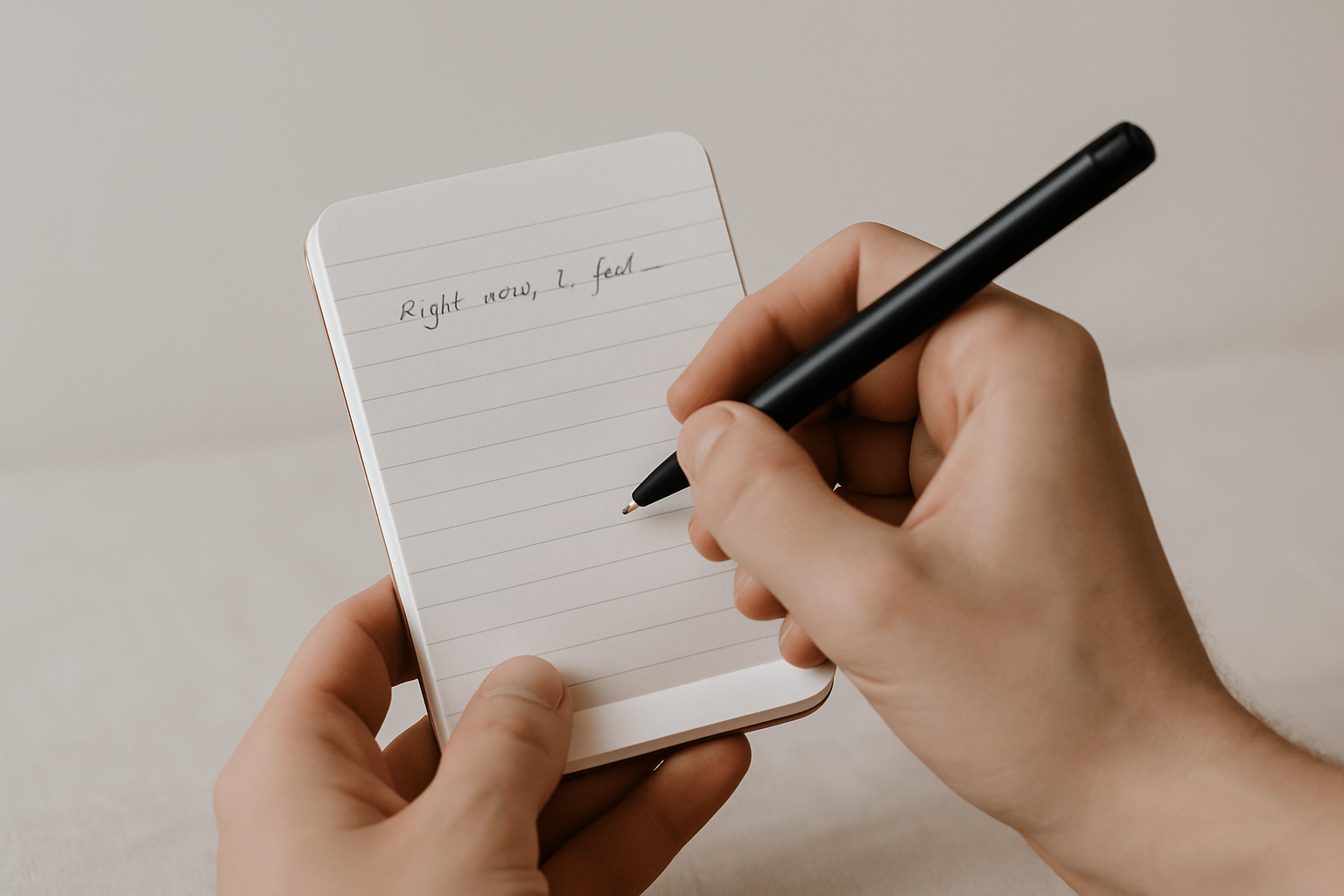Micro-Journaling: The Fastest Way to Capture Your Emotions
This page includes affiliate links as part of the Amazon Services LLC Associates Program. This means that Intellectual Ignorance may receive a commission if you make a purchase through one of these links.
Micro‑journaling is an activity of writing—a single paragraph, single lines, or even a word—that helps you express your emotions and allows you to express them in any way.
Use it when you don’t have time to write a lot, when you run out of words while writing, and when you don’t want to write a whole page.
It takes the pressure off: even one clear line is enough to capture what matters.
You’ve probably felt writer’s block—for example: "Mind blank before writing—one breath, one line."
When you are really excited to write—you grasp your journal, pick up your favorite pen—but as soon as you sit down, you forget what you were about to write. In that context, micro‑journaling can come in very handy.
Quick start (Carry→Capture→Expand): you don't have to worry about carrying a big notebook and finding a perfect place to write.
You can write any time of the day—on the bus, before a quiz, after a fight with a friend, or during a mid‑lecture overwhelm. These quick snapshots add up and make it easier to remember how the day actually felt.
So what I recommend is to keep a small pocket‑size notebook or sticky notes and a pen with you at all times; if you can’t do that, use your mobile phone to quickly record the thoughts you feel are really important and that you want to write later. You can also use a voice memo when typing feels like too much.
I use a pocket notebook and a ballpoint or gel pen, and when I don't have my notebook I use my mobile phone. My favorite apps are Keep Notes for Android and Apple Notes for iOS. You can pin the notes widget on my home screen so that you can capture a line in two taps.
If you are using a small sticky‑note book, you can paste your sticky notes into your main bigger journal (if you have one); and if you are using a mobile phone, you can later go back to it and write about those quick lines in detail in your main journal. A simple tag like #mood or #class helps you find them later.
For me, I use a combination of a pocket notebook and my mobile phone to record my thoughts when I am not near my main journal.
I have been using the Keep Notes app from Google for the last two years to record my thoughts, and it has turned out to be really helpful.
Whenever I look back at them, I always have this feeling of satisfaction—and a bit of fear—because if I hadn’t recorded those thoughts, they would have been lost, and losing those would be a very big tragedy for me personally.
To start today, take a breath, open your notes app or pocket notebook, and set a 60‑second timer. Capture one line whenever these moments pop up—when you feel really low, when motivation drops, right after a stressful class, on the bus ride home, or before sleep. The goal is momentum, not perfection.
Here is a few prompts you can use for your micro journal:
“Right now, I feel ___. And that’s okay.”
→ Regulate emotions by naming them simply and gently.
✎ 2. “One thing that went okay today was…”
→ Builds resilience by focusing on neutral-to-good moments.
✎ 3. “Something I’m holding in my body is…”
→ Increases somatic awareness + stress signals.
✎ 4. “A thought that’s been loud lately is…”
→ Spot unhelpful or anxious thought patterns.
✎ 5. “If my inner critic had a name, today it would say…”
→ Externalizes self-judgment so you can respond more kindly.
✎ 6. “One small thing I can control today is…”
→ Brings grounding during chaos.
✎ 7. “If I were a little more gentle with myself, I would…”
→ Invites self-compassion + emotional flexibility.
✎ 8. “Something I haven’t admitted to myself yet is…”
→ Facilitates honest reflection without pressure to act.
✎ 9. “A part of me wants ___. A different part of me wants ___.”
→ Explores ambivalence or internal conflict without judgment.
✎ 10. “Today, I choose to believe that I am still…”
→ Affirmation rooted in truth, not fluff. E.g., “trying,” “growing,” “allowed to rest.”
Micro‑journaling is not about perfect pages, it’s about getting your thoughts out in real moments so you don’t lose them. Start small, keep it easy, and let those one‑liners stack into clarity.
Read my other post on the benefits of journaling, how it supports mood, focus, and stress management.

